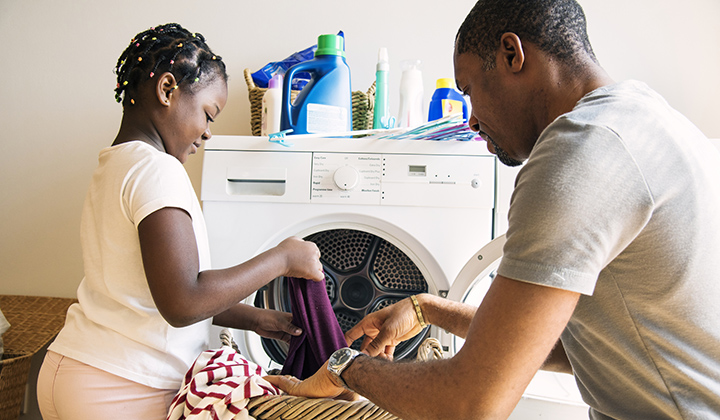
As children grow up, it’s important for them to feel a part of the household and learn life skills. One way to do this is to assign them chores. Which, for a lot of us, comes with so much confusion. What chores are appropriate for them at certain ages? Should they be expected to do them, or should chores earn them an allowance? It’s sometimes a battle, but here are some things that can help.
Getting started
Chores are important for all children regardless of the age. Chores teach children responsibility and to be a contributing member of the family. Especially in young children who love to help and feel needed.
It is important for parents to let go of expectations. If a child helps fold a towel, but it is not how you would do it, let it go! It can create a teaching opportunity to show the child how to fold the towel. When completing chores, start by showing the child how to do it. Then, allow them to assist you, while describing the important steps. Lastly, supervise and coach them remembering to praise often throughout the task. Never underestimate the value of praise! The more you praise a behavior, the more of that behavior you get.
Best chores by age
It is always important to evaluate the safety and supervision necessary for each task. Try to start chores early, as young children love to be “helpers.” Here’s a general guideline of examples for appropriate chores by age.
- Ages 3 and under: put toys away, feed a pet, or place dirty clothes in the hamper.
- Ages 4 to 6: make their beds, empty trashcans, bring in the mail, clear the table and water flowers.
- Ages 6 to 9: sort laundry, sweep floors, set the table, help pack lunches, make lunches and keep bedroom tidy by putting books on shelf, clothes in hamper, trash in wastebasket and toys in toybox.
- Ages 9 to 12: load the dishwasher, put away groceries, vacuum, help make dinner, put away laundry and mop floor.
- Ages 12+: unload the dishwasher, fold the laundry, clean the bathroom and specify with the child what that includes.
Rewards for chores
Allowance. It’s often thought that paying children for chores is a way they could help around the house and also make their own money. You may choose that path but keep this in mind - an allowance doesn’t always reinforce the expectation that children should contribute to the family. Money is something that is not meaningful to young children. Once children do value money, they may not want to do chores at all, and still not be motivated by payment.
Rewarding children for desired behaviors is another way to approach chores. Children can play as soon as they finish the chore. I had limitations on screen time for my children, but when they wanted more, I had a list of chores with times next to them. They could earn extra screen time by completing the chore.
Decide what works best
We know children, no matter the age, respond well to routine and order. So children know what to do, try writing down the duties in chore charts, or creating visual routine cards for little ones to help. Discuss the expectations and rewards you set in your family. As parents, we can work to set the expectation and then encourage the desired behaviors with compliments on their efforts and finishing each task.
